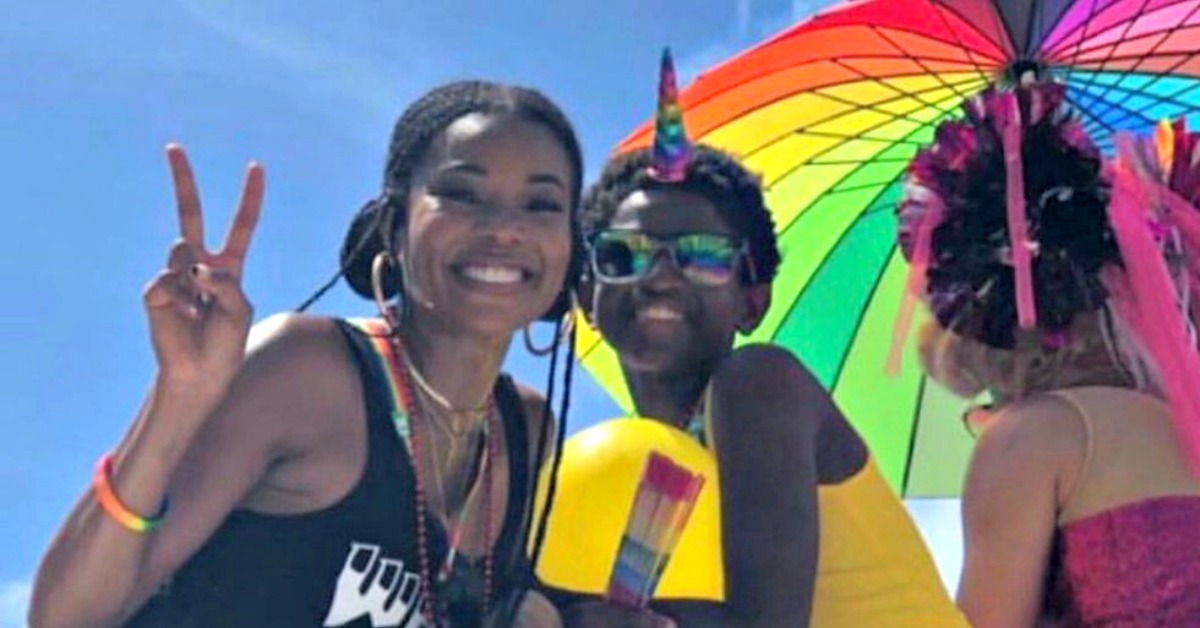I felt a surge of emotion when I saw Gabrielle Union cheesing with her 11-year-old Zion at Miami Pride. It was shocking in the best way.
It’s rare to see a queer Black child be allowed the agency needed to openly explore his sexuality. Black LGBTQ people are often treated as if our sexuality is a mark against our families and the Black community. Women who love other women are seen as too masculine or confused. Black queer men are accused of playing into the supposed agenda to emasculate Black men.
With those stereotypes in mind, I knew pushback would occur as soon as the pictures made it to the wrong side of the internet.
It's sad to see gabrielle union pimping out Dwayne Wade's 11 year old son at GAY PRIDE MIAMI which is yes a celebration but it's full of SEXUAL & DRUG INFUSED ACTIVITY and that's A FACT. WTF does a 11 year old know. LIBERALISM GONE WRONG AGAIN
— As I'm Told (@T1D1W1) April 9, 2019
So an 11 year old is participating in a pride parade? Normal kids at 11 don't even know what is being gay or sexual at that age.
— Zoli Molnar (@floridazz) April 9, 2019
The most pervasive criticism revolved around Zion’s age. Many could not fathom the idea of a pre-teen knowing he is gay. Since LGBTQ people are often overly sexualized, critics thought Zion was being exploited. Additionally, many see identifying as LGBTQ is not only a choice, but one that can only be made by adults — wrong.
I didn’t come out until my early 20s, but I cannot remember a time when I didn’t experience same-sex attraction. When I was 11 or 12, around Zion’s age, I found myself in an embarrassing situation. I was in a locker room with other girls changing for gym class. As I replaced my street clothes with my gym uniform, I couldn’t help but look at the other students changing around me. Normally, I was really discreet about it but one day, another girl caught me slippin’.
“Are you gay?!” one asked.
“Uh…no?” I responded.
“Then why are you looking at me?!” she shot back.
I denied looking at her, and the exchange ended — at least, it ended for her. I spent the rest of the day confused about what she meant by "gay." I rarely heard about queerness growing up, and if I did, it was usually in reference to men. I had no clue it was even an option for women.

After the locker room incident, I thought negatively of my attraction to other girls. I still had those feelings when I went to high school, but I remained in the closet, even though LGBTQ students were a major part of my friend circle. I didn’t come all the way out until I was 22 years old. Trying to navigate the dating world has been a challenge, because I've had to make mistakes I should've been able to make when I was a teenager.
Blavitize your inbox! Join our daily newsletter for fresh stories and breaking news.
My family was supportive when I came out. However, they had to unlearn a lot of internalized homophobia, and I was affected by it. Before I was out, my elders were not mean to LGBTQ people, but they didn’t speak fondly of them behind closed doors. It was seen as a sin and something to be delivered from. Thankfully, their thoughts have progressed, but I am still unlearning some of that shame.
This is a common experience for Black LGBTQ youth. According to a study by the Human Rights Campaign and the University of Connecticut, more than three-fourths of Black LGBTQ youth heard family members insult LGBTQ people. Almost half of respondents have experienced ridicule from their family members
Zion is truly blessed to be able to be his complete self at such a young age. He is allowed a freedom of expression most Black children — regardless of sexuality — are not afforded. This suppression has dire consequences. Mistreatment from their families led to mental distress in eighty percent of those surveyed for the HRC study. Nearly half of them thought negatively of their identities.
As Blavity previously reported, a 2015 Nationwide Children’s Hospital (NCH) suicide rates among Black children doubled between 1993 and 2012. Additionally, LGBTQ children are also more likely to commit suicide compared to their heterosexual and gender-conforming peers. A study by the National LGBTQ Task Force determined 49 percent of Black transgender respondents have attempted suicide. The Trevor Project found LBG youth are five times more likely to attempt suicide. Those who came from extremely intolerant families were 8.4 times more likely to attempt suicide compared to those who faced little or no resistance.
If we want to raise healthy and happy queer and trans children, we have to find ways to let them grow into themselves. Most pride festivals are free and open to the presence of children. If Pride is too much sauce, I recommend parents take their children around LGBTQ people, so they can be able to see the fullness of humanity. PFLAG is a great resource for parents who need guidance on how they can support their LGBTQ kids.
If you have an LGBTQ child, take them seriously and don’t try to change them — they will thank you when they are grown.
Now, check these out:
Gabrielle Union Takes Her Family To Miami Pride In Support Of Her Gay Stepson
Forever Your Dad: A Letter To Nipsey Hussle’s Sons And Daughter
